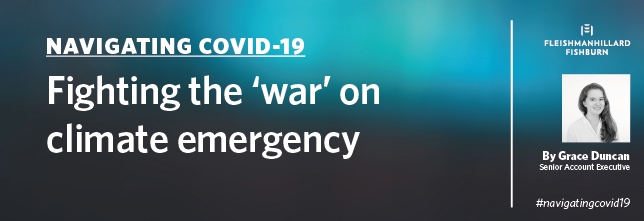Fighting the ‘war’ on climate emergency

By Grace Duncan, Senior Account Executive.
In the last few months, institutions have talked about the ‘war’ on COVID-19 and our ‘front-line heroes’ fighting a ‘deadly enemy’. While there has been debate about whether referring to a virus as if we were approaching World War Three is appropriate, it prompted rational and immediate reaction. With COVID-19 guidelines changing, the language change, and crucially the need for the public to react to that language change, has never been more important.
Throughout this period, the urgency of the language used around COVID-19 mirrored the urgency of the crisis. With media, government and businesses giving clear direction and scientific explanations for the decisions made. As we come out of the initial coronavirus crisis response, we must address the other ongoing crisis – the climate emergency – taking with us key learnings on language to drive action.
According to our Changing Voices in Climate Change Research, 66% of Brits are more concerned about climate change since the outbreak of the pandemic. It is therefore not surprising that 40% of respondents want governments, media and businesses to use stronger terms like ‘climate emergency’. What’s more, nearly a third of the people we surveyed found themselves ‘tuning out’ of climate stories with 22% of people finding them ‘repetitive’.
When describing COVID-19, the UN General Secretary said, ‘We are at war with a virus – and not winning it. …This war needs a war-time plan to fight it’. This rhetoric prompts immediate reaction whether by inciting fear, bringing people together, encouraging ownership of our actions, or all three. As people become more concerned about the climate emergency and want to drive real change, its vital that we use language that reflects the scale of the issue.
To do this not only do we need to use emotional language, we also need to tackle the issue head on. Communications on climate change need to be less vague, more inspiring and more urgent. Of course, some are already doing this. The Guardian last year announced that they would change their language rules to emphasise that we are living in a climate crisis not merely a change. While this is a good start, we need more voices echoing the severity of the situation.
We must also lean on the science but communicate free of the jargon that often accompanies it. Our research found that people want to hear from the experts when it comes to climate change, but equally using scientific language can leave the public confused and distant. This pandemic has seen a significant amount of discussion around the science; however, when inspiring action, scientific language is rarely front and centre. Communication has focused on what people need to know and what they need to do. Simple, actionable and jargon free is what needs to be replicated when talking about the planet.
In 2015, Margaret Atwood wrote that it should not be called ‘climate change’ but ‘everything change’ as it will affect every system in the world whether human or non-human. As communicators, we need businesses (including our own) to speak more clearly and openly about the climate crisis. Instead of using phrases which have become synonymous with business sustainability talk, we need climate issues to be inspiring and effective. COVID-19 has taught us lots of things, one of which being that if you want change, delivering the right message is fundamental.
TRUE Global Intelligence, the in-house research practice of FleishmanHillard, and Purposeful Business, the in-house Purpose team at FleishmanHillard Fishburn fielded an online survey of 2000 adults 18 and older in the UK in April 2020.
Find Out More
-
Achieving Outsized Impact by Building Stronger Country Reputation
February 18, 2025


